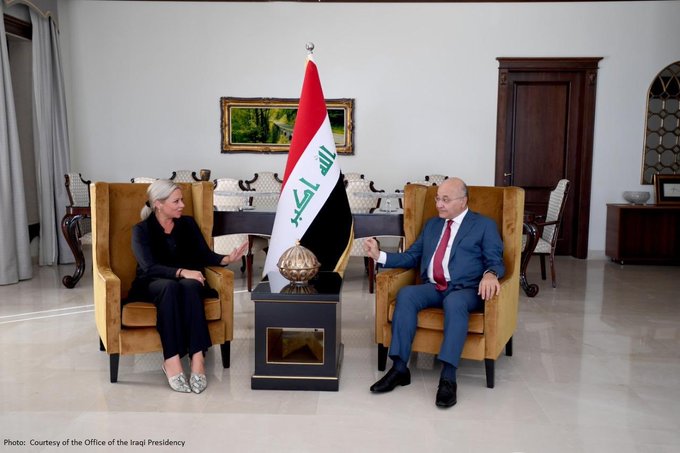At the end of July, Iraq's prime minister Mustafa al-Kadhimi declared that parliamentary elections would take place in June (June 6th). Today? Lawk Ghafuri (RUDAW) reports, "Iraq's three leaders, the president, prime minister, and parliament speaker, are united in their support for a statement from the highest Shiite authority in Iraq, Grand Ayatollah Ali al-Sistani, backing early elections held with 'integrity and transparency'." AP adds, "Grand Ayatollah Ali al-Sistani’s comments came in a statement released by his office after a meeting with the U.N. envoy to Iraq, Jeanine Hennis-Plasschaert. A photo released by al-Sistani’s office showed the black-turbaned cleric meeting with the U.N. envoy and an interpreter." Mina Aldroubi (THE NATIONAL) reports:
It was his first public face-to-face meeting with a foreign official since the outbreak of coronavirus in Iraq.
Iraq has been hit hard by the pandemic, recording more than 290,000 confirmed cases and more than 8,000 deaths.
Mr Al Sistani does not make public appearances and typically issues a weekly Friday sermon through a representative.
He is Iraq’s most influential Shiite cleric and has given significant support to the country’s protest movement.
UNAMI Tweets:
A debate within Iraq over whether
it should ask to be exempt from Opec+ oil supply cuts has resurfaced as
low prices squeeze its finances, challenging a government struggling to
tackle the destruction of years of war and rampant corruption.
Opec’s second-biggest producer, Iraq has failed in the past to fully
comply with Opec+ oil output reductions, pumping above its production
targets since the pact was first signed in 2016 between Opec and its
allies led by Russia.
“Iraq always believed they were not properly treated in December 2016
when they were not exempted. As the economy continues to reel from low
prices this issue keeps resurfacing,” said an Opec source.
Iraq’s economy and oil sector were battered by years of wars, sanctions and a stubborn insurgency triggered by the US invasion.
Baghdad complained it had struggled to revive its stagnating oil
industry, at a time where other Opec members benefited and boosted their
market share.
Iraq relies on oil to fund 97% of its state budget.
In a bit of good economic news for Iraq, BLOOMBERG MARKETS notes, "Iraq will offer barley for export for the first time after ample rains and price incentives spurred farmers to grow a surplus of the grain. The government plans to start auctioning 700,000 tons of the grain next week and anticipates interest from Gulf Arab states, Jordan and countries in North Africa, agriculture ministry spokesman Hameed Al-Nayef said by phone. It’s setting a minimum price of $125 per ton."
Kat's "Kat's Korner: Maria McKee and Bright Eyes both return" went up earlier. The following sites updated:
